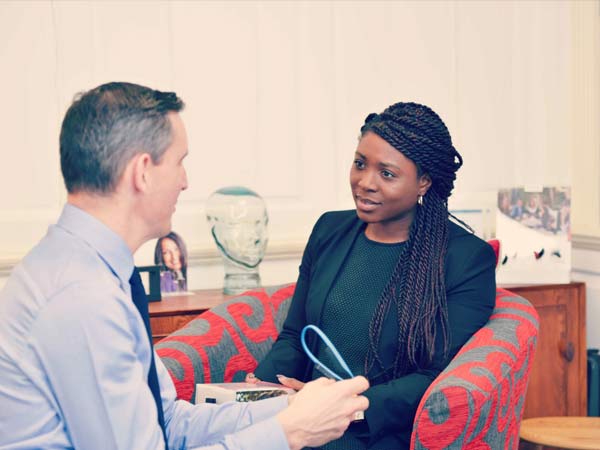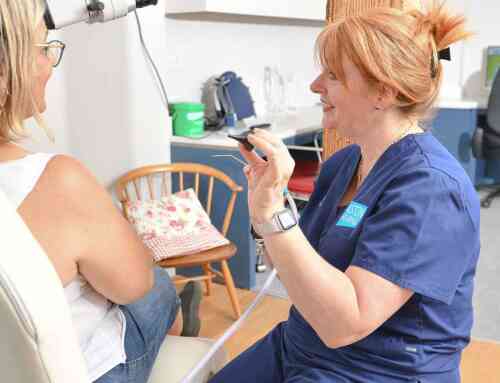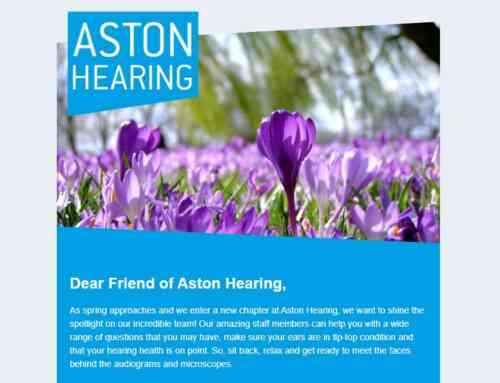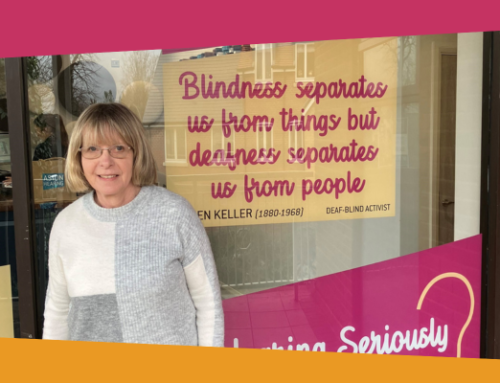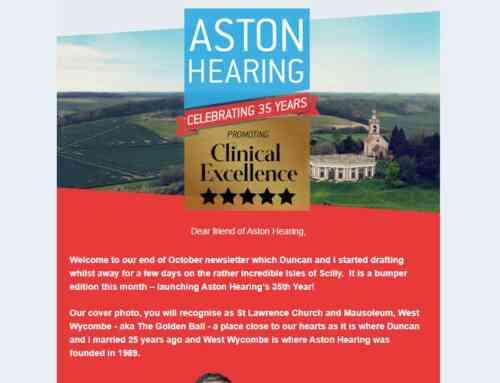DON’T TURN UP THE VOLUME, GET YOUR HEARING TESTED
With World Hearing Day being marked on 3rd of March, now is the time to get your hearing checked if you have been delaying it according to Aston Hearing in Thame. Approximately 11 million people in the UK are currently suffering from hearing loss which equates to roughly one in six of us. Of the six million people in the UK who could benefit from hearing aids only two million have them and of this group only 30% use them regularly.
Duncan Collet-Fenson, Audiologist and Managing Director of Aston Hearing, says we should regularly check our hearing in the same way we get our eyesight checked. “If you realised your sight wasn’t as good as it was previously, you would probably go to the optician or your doctor. If you suddenly lost your sight you would most likely go to casualty but its extraordinary how many people live with hearing loss without getting it seen to, including sudden hearing loss. Hearing is an equally vital sense and it is important to break through the misconceptions that hearing loss is just a sign of ageing when it can affect anyone at any age.
“A good rule of thumb is you should get your hearing checked throughout your life – at critical age markers as for children – so when they start nursery, school and then as a teenager, and ideally every five to seven years if you are 18-45 years old, increasing to every three years between the ages of 45-60 and every two years if you are over 60; or sooner if you suspect any sort of hearing loss.”
But even when people are tested and purchase a much-needed hearing aid, or wait to receive one on the NHS, the devices often sit in a drawer. Collet-Fenson says: “Hearing aids are not the same as glasses. Unlike when you get a new pair of glasses and you can instantly see well, the brain needs to adjust to the quality of sound coming from the hearing aid so it is still difficult to restore full hearing with hearing aids immediately and the aids may need multiple adjustments. The right one though can make a truly significant difference and can be life changing.
“It is also important to bear in mind that all aids are not created equal. With technology ever advancing, you can buy hearing aids which are hardly noticeable and that perform an incredible number of functions such as connecting to your phone to allow you to receive phone calls through your hearing aids. Using an app you can control volume, sound quality and change to different listening programs.”
What is Hearing Loss?
The ear is a complex and very sensitive organ. Its main function is to transmit and transduce sound to the brain and is vital for balance. There are three main types of hearing loss:-
Sensorineural hearing loss reduces the intensity of sound and distortions may mean you can struggle to hear words clearly, particularly consonant sounds and when in noisy environments.
Conductive hearing loss is when a physical condition – such as a build-up of ear wax or ear infection – stops sound from being conducted from the outer or middle ear, to the inner ear, where nerves are stimulated to carry sound to the brain. In most cases, it is very treatable and doesn’t lead to permanent hearing damage.
Central hearing loss is rare and occurs when there is a defect in your brain or central nervous system rather than in the ear itself or the auditory nerve.
But hearing loss may not be as obvious as you think and can develop gradually over a long period of time. Examples of the first signs of hearing loss include difficulty hearing people over the phone or needing to turn up the volume on the television, problems concentrating, or having to ask people to repeat themselves especially in noisy areas.
“You don’t understand the gift of hearing until you don’t have it. Poor hearing is not just an inconvenience. Hearing allows to us work, communicate and socialise. We need to appreciate the importance of our ears and hearing and change the conversation for those suffering from hearing loss from hearing disability, to hearing ability, because much can be done to help.”
Get Tested Now
Untreated hearing loss is now being routinely linked to several medical conditions including an increased risk of dementia, depression, falls and even strokes. Untreated hearing loss also leads to longer hospitalisations, readmissions and more visits to casualty.
“Unfortunately, people tend to wait much too long to get their hearing tested and the longer they wait, the harder it is to treat hearing loss. This is especially true with Sudden Sensorineural Hearing Loss (SSHL) – also known as sudden deafness – which is an emergency and typically occurs in only one ear but can appear in both. This condition mostly affects people between the ages of 30-60 and around 50% of people with SSHL recover within two weeks if they receive prompt treatment. This is a serious medical condition and requires immediate care, so if you have a sudden loss of hearing seek medical advice as soon as possible as it may just save your hearing.”
Age-Related Hearing Loss
Although hearing loss can affect anyone at any age there is a direct correlation with ageing; with around 50% of us above the age of 75 experiencing hearing loss. Age-related hearing loss often comes on slowly, making it harder for people to know when to take it seriously. It is thought that on average, there is a 10-year delay between the onset of hearing loss in older people and them seeking help with the condition, due to failure to recognise the symptoms, denial and stigma, as well as some GPs failing to refer some adults who could benefit from hearing services
Collet-Fenson says: “Hearing loss can sometimes be mistaken for dementia because of trouble following conversations, confusion, forgetfulness and social withdrawal. People who can’t hear well often become socially isolated and deprived of stimuli that keep the brain cognitively engaged thereby even potentially affecting brain function.”
The most common causes of hearing loss are:-
- Exposure to loud noises – this is commonly associated with the onset of tinnitus but can also cause general hearing loss as well.
- Ear infections
- Birth defects
- Genetics
- Adverse reactions to drugs, particularly chemotherapy
- Ageing
- Wax build up

